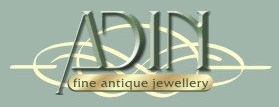Nu gespreide betaling mogelijk op het juweel van uw dromen! Vraag ons naar de details.
Gratis verzekerde verzending van alle orders!
Vintage Art Deco Beauty: Jack Russell Terrier Brooch
This Art Deco vintage brooch, circa 1920, not only captures the essence of the era but also kindles a sense of nostalgia and wonder. The masterful reverse intaglio crystal, a technique refined by Emile Marius Pradier, depicts two Jack Russell Terriers with mesmerising detail and depth, evoking memories of a bygone era. Framed in 18K yellow gold and platinum, and adorned with 44 rose cut diamonds and four sapphires, this piece reflects the geometric and abstract art influences of its time. It is a tangible connection to the past, offering a glimpse into the artistic marvels of the early 20th century, and a testament to the timeless bond between humans and their canine companions.
Antique jewelry object group
brooch
Condition
very good condition
more info on our condition scale
Country of origin
unknown
Style
Art Deco - Art Deco is an eclectic artistic and design style which had its origins in Paris in the first decades of the 20th century. The style originated in the 1920s and continued to be employed until after World War II. The term "art deco" first saw
wide use after an exhibition in 1966, referring to the 1925 Exposition Internationale des Arts Décoratifs et Industriels Modernes that was the culmination of high-end style modern in Paris. Led by the best designers in the decorative arts such as
fashion, and interior design, Art Deco affected all areas of design throughout the 1920s and 1930s, including architecture and industrial design, as well as the visual arts such as painting, the graphic arts and film. At the time, this style was seen as
elegant, glamorous, functional and modern.
See also: Art Deco
more info on styles
Style specifics
Abstract motives and geometrical forms are quite typical for the Art Deco period.
Art Deco moved away from the soft pastels and organic forms of its style predecessor, Art Nouveau, and embraced influences from many different styles and movements of the early 20th century, including Neoclassical, Constructivism, Cubism, Modernism,
and Futurism. Its popularity peaked in Europe during the Roaring Twenties and continued strongly in the United States through the 1930s. Although many design movements have political or philosophical roots or intentions, Art Deco was purely
decorative.
Period
ca. 1920
Events & facts of this era, poetry of this era,
fashion of this era.
Source of inspiration
love for dogs
Theme
two Jack Russell Terriers
Material
18K yellow gold and platinum
(touchstone tested)
more info on precious metals
Technique
Reverse intaglio crystal or English Crystal - A crystal cut in the form of a cabochon, shallow or domes, that is carved in intaglio on it flat back with a motif that is realistically painted in minute detail and is surrounded by a transparent ground.
The deeper the carving, the more pronounced the three-dimensional trompe l'oeil effect, which is sometimes enhanced by a backing of thin layer of mother-of-pearl.
The carved motif, for pieces mounted in a circular gold band as a tie pin, cuff links, button, or studs for men, was usually a racing horse, game bird or dog, and for pieces in a brooch or a locket for women, a floral design or a monogram; some examples
depict an insect or a coaching scene.
Sometimes two crystals are mounted back-to-back to form a spherical pendant, preferably with the motifs not identical but complementarily depicting the front and back views of the same subject, e.g. the head of a dog. Some examples consist of two or even
three superimposed hollow cabochons, each carved with a different motif, thus increasing the effect of perspective.
The technique was originated by Emile Marius Pradier, of Belgium, c. 1860 (he made the only known-signed example). In England it was developed by Thomas Cook in the early 1860s and carried on by his pupil Thomas Bean and the latter's son Edmund and
grandson Edgar (d. 1954).
After the popularity of the pieces in the late Victorian era, the high quality deteriorated by the 1920s, when examples were also being made in France and the United States (some modern pieces depicting motor cars and aeroplanes). The crystals have long
been identified with the Hancocks firm. The crystals have sometimes been referred to by the misnomers 'Essex Crystal' or 'Wessex crystal', owing to the erroneous assumption that they were decorated c. 1860 by the enamel portrait painter William Essex (d.
1869).
Imitations have been made of carved and painted glass, and even of a glass cabochon above a printed paper design.
Diamonds
44
rose cut diamonds
. We do not have the weight of the diamonds which is normal in our trade when it comes to rose cuts.
All diamonds we offer are screened by the I.J.G.C. for whether they are natural or synthetic, and all diamonds in this jewel are 100% guaranteed to be natural.
Precious stones
Four
sapphires
. We did not check if the sapphires are lab produced
or not as this information has no influence on the value of this jewel. Natural sapphires
and lab produced sapphires were both used in this era, rather more for their effect than for their intrinsic value.
Birthstones
Diamond is the birthstone (or month stone) for April
and sapphire for September.
more info on birthstones
Hallmarks
No trace.
more info on hallmarks
Dimensions
2,60 cm (1,02 inch) x 3,10 cm (1,22 inch)
see picture with a ruler in millimeters and inches
Weight
11,20 gram (7,20 dwt)
Adin Reference Nº
23303-0048
Copyright photography
Adin, fine antique jewellery
Additional information
our latest acquisitions
jewelry glossary
wall of fame
visit us in Antwerp
subscribe to our mailinglist



